Hyundai Tucson vs Skoda Superb Limousine – Which model is better for everyday use?
Compare performance, boot capacity, efficiency and price at a glance.
Find out which car is the better choice for you – Hyundai Tucson or Skoda Superb Limousine?
Costs and Efficiency: Looking at overall running costs, both models reveal some interesting differences in everyday economy.
Hyundai Tucson has a a bit advantage in terms of price – it starts at 30600 £, while the Skoda Superb Limousine costs 34200 £. That’s a price difference of around 3566 £.
Fuel consumption also shows a difference: Skoda Superb Limousine manages with 0.30 L and is therefore significantly more efficient than the Hyundai Tucson with 1 L. The difference is about 0.70 L per 100 km.
As for range, the Skoda Superb Limousine performs convincingly better – achieving up to 137 km, about 67 km more than the Hyundai Tucson.
Engine and Performance: Under the bonnet, it becomes clear which model is tuned for sportiness and which one takes the lead when you hit the accelerator.
When it comes to engine power, the Skoda Superb Limousine has a slight edge – offering 265 HP compared to 252 HP. That’s roughly 13 HP more horsepower.
In acceleration from 0 to 100 km/h, the Skoda Superb Limousine is decisively quicker – completing the sprint in 5.60 s, while the Hyundai Tucson takes 7.90 s. That’s about 2.30 s faster.
In terms of top speed, the Skoda Superb Limousine performs clearly perceptible better – reaching 250 km/h, while the Hyundai Tucson tops out at 194 km/h. The difference is around 56 km/h.
There’s also a difference in torque: Skoda Superb Limousine pulls hardly perceptible stronger with 400 Nm compared to 367 Nm. That’s about 33 Nm difference.
Space and Everyday Use: Beyond pure performance, interior space and usability matter most in daily life. This is where you see which car is more practical and versatile.
Both vehicles offer seating for 5 people.
In curb weight, Hyundai Tucson is hardly perceptible lighter – 1520 kg compared to 1559 kg. The difference is around 39 kg.
In terms of boot space, the Skoda Superb Limousine offers slight more room – 645 L compared to 620 L. That’s a difference of about 25 L.
In maximum load capacity, the Hyundai Tucson performs slight better – up to 1799 L, which is about 4 L more than the Skoda Superb Limousine.
When it comes to payload, Skoda Superb Limousine minimal takes the win – 580 kg compared to 545 kg. That’s a difference of about 35 kg.
Who wins the race?
The Skoda Superb Limousine proves to be outperforms in nearly all aspects and therefore becomes our DriveDuel Champion!
Skoda Superb Limousine is the better all-rounder in this comparison.
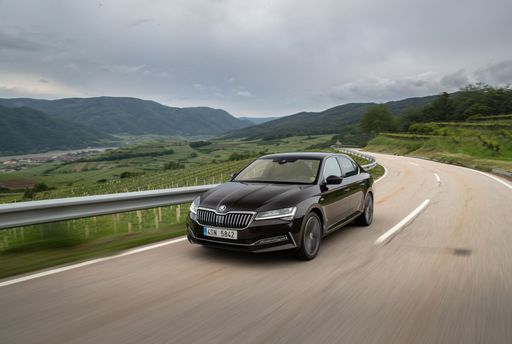
Skoda Superb Limousine
Hyundai Tucson
The Hyundai Tucson is a standout choice in the compact SUV segment, offering a perfect blend of style, comfort, and practicality. Its modern design is complemented by a spacious interior that provides ample room for passengers and luggage alike. With advanced technology and safety features, the Tucson ensures a smooth and enjoyable driving experience.
details @ hyundai.news
@ hyundai.news
 @ hyundai.news
@ hyundai.news
 @ hyundai.news
@ hyundai.news
 @ hyundai.news
@ hyundai.news
 @ hyundai.news
@ hyundai.news
Skoda Superb Limousine
The Skoda Superb Saloon impresses with its elegant design and spacious interior, making it a standout choice in the executive car segment. It offers a smooth and comfortable ride, with a range of advanced features that enhance both convenience and safety for drivers and passengers alike. Balancing performance and efficiency, the Superb provides a satisfying driving experience that caters to both city commuting and long-distance travel.
details @ Skoda Presse Deutschland
@ Skoda Presse Deutschland
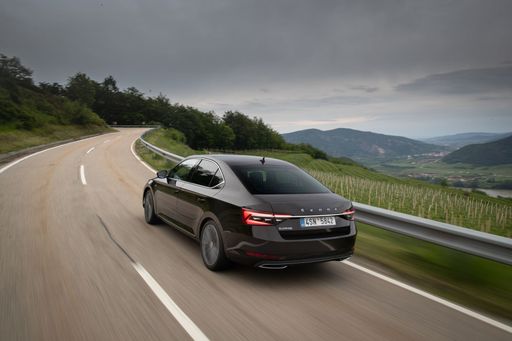 @ Skoda Presse Deutschland
@ Skoda Presse Deutschland
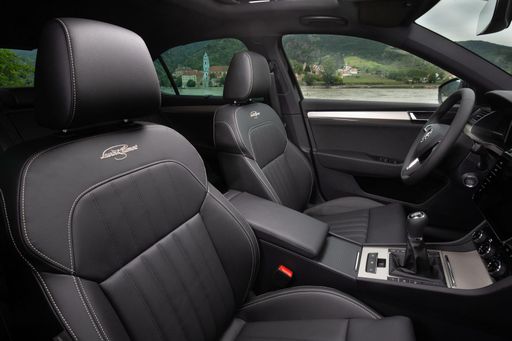 @ Skoda Presse Deutschland
@ Skoda Presse Deutschland
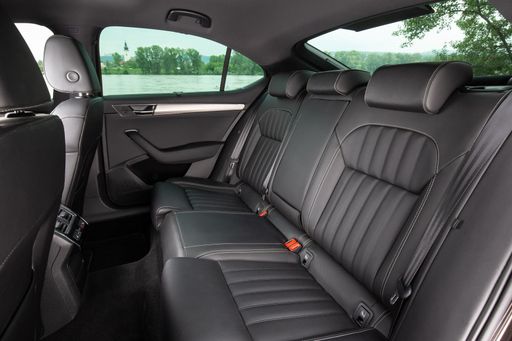 @ Skoda Presse Deutschland
@ Skoda Presse Deutschland
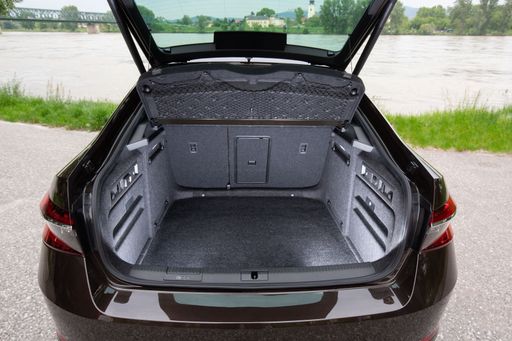 @ Skoda Presse Deutschland
@ Skoda Presse Deutschland

|

|
|
|
|
Costs and Consumption |
|
|---|---|
|
Price
30600 - 46300 £
|
Price
34200 - 50500 £
|
|
Consumption L/100km
1 - 6.9 L
|
Consumption L/100km
0.3 - 7.7 L
|
|
Consumption kWh/100km
-
|
Consumption kWh/100km
-
|
|
Electric Range
64 - 70 km
|
Electric Range
128 - 137 km
|
|
Battery Capacity
-
|
Battery Capacity
19.70 kWh
|
|
co2
22 - 156 g/km
|
co2
8 - 175 g/km
|
|
Fuel tank capacity
42 - 54 L
|
Fuel tank capacity
45 - 66 L
|
Dimensions and Body |
|
|---|---|
|
Body Type
SUV
|
Body Type
Sedan
|
|
Seats
5
|
Seats
5
|
|
Doors
5
|
Doors
5
|
|
Curb weight
1520 - 1889 kg
|
Curb weight
1559 - 1734 kg
|
|
Trunk capacity
546 - 620 L
|
Trunk capacity
486 - 645 L
|
|
Length
4510 - 4520 mm
|
Length
4912 mm
|
|
Width
1865 mm
|
Width
1849 mm
|
|
Height
1650 mm
|
Height
1481 mm
|
|
Max trunk capacity
1721 - 1799 L
|
Max trunk capacity
1635 - 1795 L
|
|
Payload
525 - 545 kg
|
Payload
541 - 580 kg
|
Engine and Performance |
|
|---|---|
|
Engine Type
Diesel MHEV, Petrol MHEV, Petrol, Full Hybrid, Plugin Hybrid
|
Engine Type
Petrol, Plugin Hybrid, Petrol MHEV, Diesel
|
|
Transmission
Automatic, Manuel
|
Transmission
Automatic
|
|
Transmission Detail
Dual-Clutch Automatic, Manual Gearbox, Automatic Gearbox
|
Transmission Detail
Dual-Clutch Automatic
|
|
Drive Type
Front-Wheel Drive, All-Wheel Drive
|
Drive Type
Front-Wheel Drive, All-Wheel Drive
|
|
Power HP
136 - 252 HP
|
Power HP
150 - 265 HP
|
|
Acceleration 0-100km/h
7.9 - 11.6 s
|
Acceleration 0-100km/h
5.6 - 9.2 s
|
|
Max Speed
180 - 194 km/h
|
Max Speed
220 - 250 km/h
|
|
Torque
265 - 367 Nm
|
Torque
250 - 400 Nm
|
|
Number of Cylinders
4
|
Number of Cylinders
4
|
|
Power kW
100 - 185 kW
|
Power kW
110 - 195 kW
|
|
Engine capacity
1598 cm3
|
Engine capacity
1498 - 1984 cm3
|
General |
|
|---|---|
|
Model Year
2024
|
Model Year
2024 - 2025
|
|
CO2 Efficiency Class
E, F, D, B
|
CO2 Efficiency Class
E, B, D, F
|
|
Brand
Hyundai
|
Brand
Skoda
|
What drive types are available for the Hyundai Tucson?
Available configurations include Front-Wheel Drive or All-Wheel Drive.
The prices and data displayed are estimates based on German list prices and may vary by country. This information is not legally binding.
